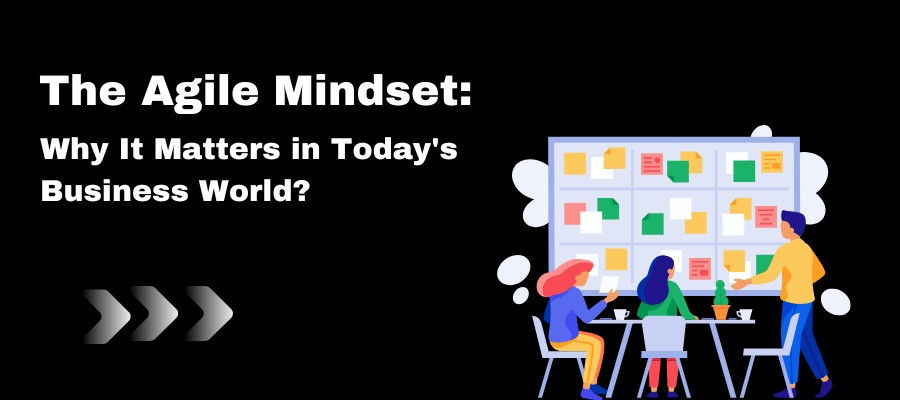The Agile Mindset: Why It Matters in Today's Business World?

Agile Mindset represents a unique way of professional thinking that emphasizes flexibility, collaboration, and continuous improvement. In today's fast-paced business world, Project Teams must have the ability to adapt quickly and efficiently. Adapting an Agile Mindset in the workplace encourages better team productivity with smooth collaboration. This attitude positively impacts the workplace, where everyone feels driven to work for the same Product Goal. This article discusses the impact of the Agile mindset in today’s world and how to develop an Agile mindset in the workplace!
What is the Agile Mindset?
An Agile mindset is a unique way of professional thinking that values adaptability, flexibility, and continuous learning. It's a unique approach that focuses on responding to change rather than following a rigid plan in the workplace. An Agile mindset is about being open to new ideas, creative thinking, embracing uncertainty, and willingness to experiment.
"Agile" originally referred to software development principles outlined in the Agile Manifesto 2001. Following a predetermined roadmap, these principles prioritize customer satisfaction, team collaboration, and responsiveness. However, the Agile mindset has since expanded beyond software development. It has now become a widely adopted approach across various industries and functions.
Why does the Agile Mindset matter?
Today’s business landscape is highly competitive. Enterprises are working on becoming Agile Aware to thrive in their business goals. The Agile mindset has emerged as a popular approach to meet the challenges of the current business environment.
Organizations that adopt an agile mindset can respond quickly to change, embrace innovation, and foster team collaboration. It helps to meet customer expectations at the forefront. By cultivating an Agile mindset, the Product Owner can push the Scrum Team and Developers to work efficiently. It helps companies to stay ahead of the curve, seize new opportunities, and remain relevant in a rapidly evolving world.
Here are the highlighted reasons behind the increasing demand for developing an Agile Mindset:
Responding to Change Faster:
Companies require to be able to adapt to industry changes quickly to stay relevant. An Agile mindset enables teams to respond to change more effectively, as it values continuous learning. Instead of sticking to a rigid plan, an Agile Leader can quickly pivot the development strategy based on the latest feedback.
Increased Team Collaboration:
An Agile mindset emphasizes collaboration and communication among Agile Teams. It values input from all stakeholders so that everything is transparent among all. This approach leads to increased innovation and more effective problem-solving. Teams working in an Agile environment are likelier to share knowledge and skills, leading to a more cohesive and productive work environment.
Quicker Decision-Making:
An Agile mindset promotes faster decision-making, encouraging teams to prioritize action over analysis. Instead of spending weeks or months analyzing a problem, an Agile team can quickly test and iterate potential solutions. It allows the teams to make more informed decisions based on real-world data and feedback received.
Increased Creative-Thinking & Innovation:
An Agile mindset prioritizes experimentation over process iterations. It encourages the teams to take risks and try new approaches. Teams working in an Agile environment will likely embrace failure as a learning opportunity. It can lead to breakthrough ideas and creative solutions.
Improved Customer Satisfaction:
An Agile mindset prioritizes customer satisfaction and responsiveness to feedback. By prioritizing the customer's needs, the Product Owner conveys the Product Vision for the Developers to work on. It leads to faster delivery with higher customer satisfaction and loyalty.
How to Develop an Agile Mindset?
Developing an agile mindset requires a shift in thinking and behavior. Here are some ways you can cultivate an agile mindset:
- Embrace the change: The agile mindset prioritizes flexibility and adaptability. Embrace transformation as an opportunity to learn and improve.
- Keep experimenting: Take an experimental approach to problem-solving. Try new things, learn from failure, and iterate.
- Collaborate with others: Work in cross-functional teams and embrace the diversity of thought. Seek out input and feedback from others.
- Focus on customer demands: Prioritize customer collaboration and feedback. Keep the customer at the center of everything you do.
- Learn continuously: The agile mindset emphasizes continuous learning and improvement. Seek out opportunities for professional development and growth.
Finally, be Agile in your approach to work. Be willing to pivot when necessary. Look for ways to improve your processes and outcomes constantly. Companies can foster diversity by creating a culture of inclusion and providing development opportunities.
Key Benefits of the Agile Mindset:
The benefits of adopting an agile mindset are numerous. Here are some of the critical advantages of adapting companies:
- Faster Innovation: Companies can bring new products and services to the market, satisfying consumer demands before competitors.
- Improved Customer Satisfaction: By making customers the center of attention, it’s easy to develop an agile mindset to increase customer satisfaction.
- Increased Flexibility: With a willingness to change, companies better understand the changing market conditions.
- Greater Collaboration: Agile teams collaborate better to achieve shared Product Goals. This can lead to better communication with improved teamwork.
- Higher Employee Engagement: Employees who work in an agile environment are more motivated and empowered to make the right decisions with a clear understanding.
Key Takeaways:
The Agile Mindset is what today’s enterprises need to transition into Agile. Hence, the Agile Leaders should embrace the agile mindset and the Project Teams. With consistent efforts, enterprises can become more innovative, collaborative, and customer-focused. Hence, it’s crucial to develop an agile mindset in the workplace!
Reference
- https://www.sciencedirect.com/science/article/pii/S0040162522001822#sec0018



